城市生活的利与弊作文700字,英语作文范文,.doc
城市生活的好处和坏处的英语作文
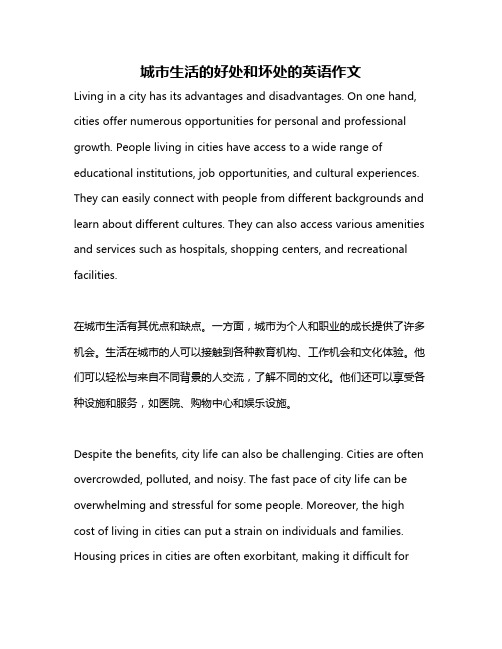
城市生活的好处和坏处的英语作文Living in a city has its advantages and disadvantages. On one hand, cities offer numerous opportunities for personal and professional growth. People living in cities have access to a wide range of educational institutions, job opportunities, and cultural experiences. They can easily connect with people from different backgrounds and learn about different cultures. They can also access various amenities and services such as hospitals, shopping centers, and recreational facilities.在城市生活有其优点和缺点。
一方面,城市为个人和职业的成长提供了许多机会。
生活在城市的人可以接触到各种教育机构、工作机会和文化体验。
他们可以轻松与来自不同背景的人交流,了解不同的文化。
他们还可以享受各种设施和服务,如医院、购物中心和娱乐设施。
Despite the benefits, city life can also be challenging. Cities are often overcrowded, polluted, and noisy. The fast pace of city life can be overwhelming and stressful for some people. Moreover, the high cost of living in cities can put a strain on individuals and families. Housing prices in cities are often exorbitant, making it difficult formany people to afford decent housing. Traffic congestion and long commutes can also eat into valuable time that could be spent with loved ones or pursuing personal interests.尽管有这些好处,城市生活也会带来挑战。
在大城市的利与弊英语作文

在大城市的利与弊英语作文Living in a big city has its own set of advantages and disadvantages. The hustle and bustle of urban life can be both exhilarating and overwhelming.The vibrant city life offers endless opportunities for personal and professional growth. With a plethora of job options, one can find a career path that aligns with their aspirations. The cultural diversity is another aspect that enriches the city experience, exposing residents to a variety of cuisines, art, and traditions.However, the downsides of city living are not to be overlooked. The high cost of living, traffic congestion, and air pollution are common concerns that can impact the quality of life. The fast-paced environment can also lead to stress and a sense of anonymity among residents.Despite the challenges, the convenience of city living is hard to beat. Access to world-class healthcare, education, and public transportation systems makes daily life more manageable. Moreover, the city's nightlife and entertainment options provide ample opportunities for relaxation and socializing.The balance between the urban advantages and drawbacks is subjective and varies from person to person. For some, the excitement and opportunities outweigh the drawbacks, whileothers may find the pace and pressures of city life too much to handle.In conclusion, whether one thrives in a big city or not depends on their personal preferences and lifestyle needs. Embracing the positive aspects while addressing the negatives can lead to a fulfilling urban experience.。
有关城市生活优缺点的英语作文

有关城市生活优缺点的英语作文【中英文版】**English Essay: Advantages and Disadvantages of Urban Life**Urban life, with its fast pace and vibrant culture, has both advantages and disadvantages.On one hand, cities offer a plethora of opportunities for education, employment, and entertainment.On the other hand, the hustle and bustle of city life can lead to increased stress and other social issues.One of the primary advantages of urban life is the abundance of educational and career opportunities.Cities are often home to prestigious universities and colleges, offering a wide range of courses and specializations.Moreover, the job market in urban areas is more diverse and extensive, providing individuals with a greater chance to find suitable employment.The presence of a variety of industries also fosters innovation and entrepreneurship.Cities are also cultural hubs, offering a rich tapestry of arts, entertainment, and social activities.Theatres, museums, art galleries, and restaurants are abundant, catering to diverse interests and tastes.The cosmopolitan nature of city life allows for exposure to different cultures and ideas, fostering a more open-minded and tolerant society.However, urban life is not without its drawbacks.The high cost of living is a significant challenge, with expenses for housing, transportation,and basic necessities being particularly high.This often leads to a higher stress level and a more competitive environment, as individuals strive to earn enough to sustain their lifestyle.Another disadvantage is the issue of overcrowding and pollution.Dense populations can lead to traffic congestion, noise pollution, and a lack of personal space.Air and water pollution are also prevalent issues in many urban areas, affecting the health and well-being of residents.Social isolation is another aspect of urban life that can be problematic.Despite the large number of people, the anonymity of city life can make it difficult to form meaningful connections and create a sense of community.In conclusion, urban life offers a wide array of opportunities and conveniences, but it also presents challenges such as high costs, pollution, and social isolation.It is up to individuals to weigh these advantages and disadvantages and decide what kind of lifestyle best suits their needs and aspirations.**中文作文:城市生活的优缺点**城市生活以其快节奏和多姿多彩的文化特色,具有明显的优缺点。
写一篇关于城市化的利与弊的英文作文
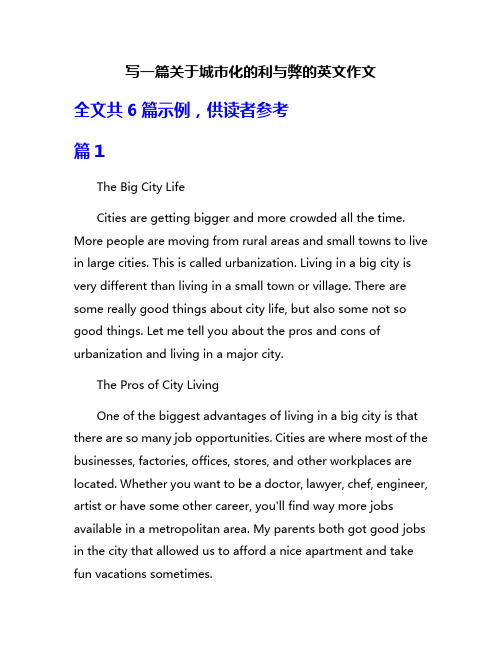
写一篇关于城市化的利与弊的英文作文全文共6篇示例,供读者参考篇1The Big City LifeCities are getting bigger and more crowded all the time. More people are moving from rural areas and small towns to live in large cities. This is called urbanization. Living in a big city is very different than living in a small town or village. There are some really good things about city life, but also some not so good things. Let me tell you about the pros and cons of urbanization and living in a major city.The Pros of City LivingOne of the biggest advantages of living in a big city is that there are so many job opportunities. Cities are where most of the businesses, factories, offices, stores, and other workplaces are located. Whether you want to be a doctor, lawyer, chef, engineer, artist or have some other career, you'll find way more jobs available in a metropolitan area. My parents both got good jobs in the city that allowed us to afford a nice apartment and take fun vacations sometimes.Another great thing about cities is there's always something to do for entertainment and cultural activities. You've got museums, concerts, theater shows, sporting events, and restaurants from every type of cuisine you can imagine. The city never sleeps with all the nightlife – there are bars, nightclubs, comedy shows, and live music venues open late. Smaller towns are quieter with not as many things going on. In a city, you'll never be bored!Cities also tend to have really good public transportation systems to help people get around without a car. There are bus routes, subways, trains, taxis, and ride shares available. Not having to drive and park everywhere makes living in the city very convenient, especially for kids too young to drive. We just hop on the bus or subway to get where we need to go.The diversity in cities is another big perk. You'll meet people from all different backgrounds, cultures, religions, and walks of life. With so many diverse residents, there are lots of ethnic neighborhoods to explore and experience different cultures through their food, festivals, and traditions. My best friends are from all over the world – India, Mexico, Somalia, and Korea.We've learned so much about each other's customs and cuisines. It's amazing!The Cons of Urban LivingWhile cities offer many advantages, there are also some major downsides to being a city dweller that you have to consider. One of the biggest issues is overcrowding and population density. Cities are packed with people living on top of each other in apartment complexes and crowds everywhere you go. It can feel chaotic, loud, and overwhelming at times with so much traffic, noise from construction, commotion on the streets, and just masses of people around constantly.Along with overcrowding comes higher costs for housing and just about everything else. Real estate is extremely expensive in cities, so you'll pay top dollar to rent or buy property even for a small living space. Things like groceries, utilities, transportation, and entertainment also tend to cost more in urban areas. For our family of four, we pay almost double the rent that my relatives in a small town pay for their whole house!Another negative aspect of city life is the increased crime rates and safety concerns, especially for kids. With more people crammed together, there are more opportunities for theft, assault, drugs, and other criminal activity in cities compared to suburban areas. My parents are very strict about where I can goby myself because of the dangers that exist. We always have to be alert and take precautions.Cities also tend to have much more pollution than rural places. With exhaust from so many cars and factories, the air quality in urban centers is often quite poor. There's smog, dust, litter, and garbage piled up in some areas as well. My friends who grew up in the country say their hometowns are much cleaner with fresh air. Cities can be kind of dirty environments.The Balanced ViewSo as you can see, there are significant pros and cons to urbanization and living in a major city. It offers incredible opportunities, amenities, and diversity. But it also comes with downsides like overcrowding, high expenses, safety issues, and pollution. Every family has to decide what environment and lifestyle suits them best.My parents say that while city life is challenging in many ways, they feel the benefits outweigh the negatives for our family situation right now. They appreciate having good career options andexposing me to people from all different backgrounds. They want me to take advantage of all the enriching activities available in an urban setting.However, my parents don't rule out possibly moving to a quieter suburb or semi-rural area one day when I'm older if city living becomes too hectic or expensive. A lot depends on future job situations and what our priorities are at that stage in our lives. Many people choose to leave cities as empty nesters or retirees.For now though, our city apartment is my home and where I'm happily growing up experiencing the energy, opportunities, and excitement that urban living offers. Just don't be surprised if you visit me sometime and I've relocated to a calmer, wide open small town somewhere! The rural life does have its advantages too.篇2The Pros and Cons of City LifeHave you ever wondered what it's like to live in a big city? Well, let me tell you all about it! Cities are amazing places with lots of people, tall buildings, and so many fun things to do. But they can also be crowded, noisy, and a bit messy sometimes. Let's explore the good and the bad sides of city life.The Pros of Living in a CityLots of OpportunitiesIn a city, there are so many job opportunities for people. You can find work in offices, restaurants, stores, hospitals, schools, and many other places. There are also lots of schools and colleges, so you can get a good education and learn new skills.Entertainment GaloreCities never get boring! There are always exciting things happening, like concerts, plays, festivals, and sports events. You can go to the movies, visit museums, or just hang out at the park. There are also lots of restaurants where you can try different kinds of delicious food from all over the world.Easy TransportationIn cities, you don't really need a car to get around. You can take the bus, train, or subway to go wherever you want. Some people even ride bicycles or scooters to get to work or school. It's easy to travel without having to worry about traffic jams or finding a parking spot.Diverse CommunitiesCities are home to people from all kinds of backgrounds and cultures. You can learn about different languages, traditions, and ways of life. You can make friends with kids from all over the world and learn so much from them.The Cons of Living in a CityOvercrowding and TrafficOne of the biggest problems in cities is that there are too many people living in a small area. This can lead to overcrowding in schools, hospitals, and public spaces. The roads are always packed with cars, buses, and trucks, which can cause heavy traffic and pollution.Noise and PollutionCities are noisy places, with the sounds of cars honking, construction work, and people shouting. The air can also get polluted from vehicle emissions and factories. This can be harmful to our health and the environment.High Cost of LivingLiving in a city is expensive. The rent or cost of buying a house is usually much higher than in smaller towns or rural areas. Even basic things like groceries, transportation, and utilities can be more costly in cities.Crime and Safety IssuesUnfortunately, cities can sometimes be unsafe places. There is a higher risk of crimes like theft, robbery, and violence in crowded areas. Parents have to be very careful and teach their children how to stay safe when out and about.As you can see, there are both positive and negative aspects to city life. Some people love the excitement and opportunities that cities offer, while others prefer the peace and quiet of smaller towns or the countryside.Personally, I think cities are amazing places, but they can also be overwhelming at times. It's important to find a balance and enjoy the best of both worlds. Maybe we could live in a city during the week for work and school, and then escape to the countryside on weekends for some fresh air and relaxation!What do you think? Would you like to live in a big city when you grow up, or would you prefer a quieter place? Let me know your thoughts!篇3The Ups and Downs of City LivingHave you ever been to a big city like New York or Tokyo? They're huge, with tall buildings, lots of people, and so much going on! Cities are cool places, but they also have somenot-so-cool parts too. Let me tell you about the good things and bad things about living in a city.The Awesome Stuff About CitiesOne of the best things about cities is that there's always something to do! You'll never get bored because there are tons of fun places to go and interesting things to see. In the city, you can visit museums to learn about art, history, and science. There are also theaters where you can watch plays, concerts, and movies. And don't forget about all the cool parks, zoos, and aquariums!Another great thing about cities is the food. You can find restaurants from all over the world serving delicious foodsyou've never tried before. Whether you want pizza, tacos, sushi, or something else entirely, the city has it all. And if you get hungry late at night, there are always places that stay open really late or even 24 hours a day!Cities are also super convenient. You don't need a car because there are buses, trains, and subways to take you wherever you need to go. And if you need to buy something,there are shops and stores all around selling everything you can imagine.The Not-So-Great Parts of City LifeWhile cities are exciting, they can also be really crowded and noisy. Imagine having hundreds of people on the same street or subway car as you – it gets pretty cramped and loud! All the cars, trucks, and construction also make a ton of noise that can be annoying.Another downside of cities is that there's a lot of pollution. With so many vehicles on the roads and factories in the area, the air isn't as clean as it is in smaller towns or the countryside. The pollution can make it hard to breathe and can even make people sick.Cities can also be expensive places to live. Rent for apartments is usually higher than in suburbs or rural areas. And things like food, clothes, and entertainment tend to cost more too. That makes it tough for some families to afford to live in the city.One more negative aspect of urban life is crime. While most neighborhoods are safe, cities tend to have more problems with things like theft, vandalism, and violent crimes than smallertowns do. You have to be extra careful when you're out and about.The Choice is YoursSo those are some of the major pros and cons of living in a big city. Every place has its good points and bad points, and cities are no exception. Personally, I think the excitement and opportunities of the city make it a super cool place, even with the downsides like noise and crowds. But maybe you'd prefer the peace and quiet of a small town instead. No matter where you live, there will be trade-offs – it's up to you to decide what's most important!Whether you're a city kid or a small-town kid, I hope you have a great community filled with fun activities, friendly people, and plenty of adventures. The world is an amazing place with so much to explore, no matter if you're in the heart of a huge metropolis or a tiny little village. The choice is yours!篇4The Big City LifeHave you ever wondered what it would be like to live in a huge city? Cities are getting bigger and bigger all the time asmore people move from small towns and the countryside into urban areas. This is called urbanization. While living in a major city definitely has some cool advantages, there are also some not-so-great downsides that come with the big city life. Let me break it down for you!The Pros of City LivingOne of the biggest perks of residing in a metropolitan area is that there is just SO much to do! In a small town, you might get bored after a while because there are limited options for entertainment, restaurants, shopping, and activities. But a gigantic city? Forget about it! There are endless opportunities to try new cuisines from around the world, watch live music and theater shows, visit world-class museums, go shopping at massive malls, and more. You'll never run out of fresh and exciting experiences.Another great thing about cities is that there are way more job and career opportunities compared to rural areas. Larger cities are home to the headquarters of major companies, hospitals, universities, and other important organizations and businesses. This means more jobs across all kinds of fields and industries. It's much easier to find a job you're passionate about in a bustling urban center.Cities also make it very convenient to get around and travel without needing a car. Most major metros have excellent public transportation systems with buses, trains, and subways that can zip you across town. Lots of people also use ride-sharing services, bike-sharing programs, or just walk to their destinations since amenities are clustered closer together. This cuts down on traffic and air pollution.The Cons of Urban LifeWhile cities offer an abundance of job options, the reality is that the cost of living tends to be much higher in urban areas. Housing, groceries, transportation, and entertainment are all more expensive. Many families struggle to keep up with soaring rental prices or mortgage costs. The job opportunities have to be weighed against the economic challenges.Another big drawback is the issue of overcrowding. Cities are densely populated with huge numbers of people crammed into a relatively small geographic area. This overcrowding can make cities feel chaotic, loud, dirty and stressful at times. Things like traffic jams, long lines, litterand excessive noise can take a toll. In very populated cities, personal space and privacy are often luxuries.Cities also tend to have higher crime rates than suburban and rural areas. With so many people compressed together, it creates more opportunities for crimes like theft, assault, and vandalism to occur. Parents often worry about the safety risks of raising children in cities and having them travel across urban areas alone.The Urbanization TrendLike it or not, the worldwide trend is toward urbanization as the global population continues growing rapidly. It's estimated that over 60% of people will be living in urban areas by the year 2050! For kids my age, chances are very high that we will end up residing in a major city at some point in our lives.While cities absolutely have their downsides with higher costs, overcrowding, crime and other problems, they also provide unmatched cultural diversity, job options, and amenities.I think the key is that city planning and infrastructure needs to keep pace with urbanization. If cities can be developed with adequate affordable housing, efficient public services, green spaces, and thoughtful regulation, then the advantages of urban living could easily outweigh the disadvantages for most people.But those are just my thoughts! What do you think about the big city life? Would you like growing up in a major metropolitanarea or does a quieter small town appeal to you more? Maybe a medium-sized city could offer a nice balance of amenities without as much overcrowding and cost? I'd love to hear your perspective!篇5The Bright Lights and Tall Buildings: The Good and Bad of City LifeHave you ever walked through a big city and felt amazed by the towering skyscrapers and the bustling streets? Cities are incredible places, filled with excitement, opportunities, and fascinating people from all over the world. But as awesome as cities can be, they also have their downsides. Let me tell you about the good and the not-so-good sides of living in a city.The Awesome Parts of City LifeOne of the best things about cities is that there's always something to do! You'll never get bored because cities arejam-packed with fun activities. There are museums to explore, parks to play in, theaters to watch shows, and restaurants serving delicious food from every culture you can imagine. In my city, we have a huge science museum with interactive exhibits that make learning about space and dinosaurs super fun!Cities also have excellent schools and universities, which means kids like me can get a great education. My school has a state-of-the-art computer lab, a huge library, and teachers who are experts in their subjects. When I grow up, I'll have the opportunity to attend a top university right in the heart of the city.Another awesome thing about cities is the diversity. People from all over the world come to live and work in cities, which means you get to experience different cultures, languages, and traditions. In my neighborhood alone, I have friends whose families are from China, Mexico, India, and Nigeria. We love learning about each other's customs and trying different foods from around the globe.The Not-So-Awesome Parts of City LifeWhile cities offer many advantages, they also have some pretty big downsides. One of the biggest problems is pollution. With so many cars, factories, and people packed into a small area, the air in cities can get really dirty and smoggy. This makes it harder to breathe and can cause health issues like asthma and lung problems.Noise pollution is also a major issue in cities. The constant honking of horns, construction work, and loud music can beoverwhelming and make it hard to concentrate or get a good night's sleep. Sometimes, I wish I could escape to a quieter place in the countryside.Another downside of city living is the lack of green spaces and nature. While cities usually have parks, they're often small and crowded. It's not the same as being able to roam freely in wide-open spaces and forests. I miss being able to go on long hikes and see wildlife like deer, rabbits, and birds in their natural habitats.Traffic and overcrowding are also major headaches in cities. The streets are always jammed with cars, buses, and people, which can make getting around a nightmare. Sometimes, it takes my family over an hour just to drive a few miles because of gridlock traffic. And don't even get me started on how crowded the subways and buses get during rush hour!The Cost of City LivingOne of the biggest drawbacks of living in a city is how expensive it can be. Housing costs are usually astronomical, with even small apartments costing a fortune. My parents have to work really hard to afford our tiny two-bedroom place in the city. And that's not even counting the high costs of things like food, entertainment, and transportation.Because space is so limited in cities, everything seems to be crammed together. Neighborhoods are densely populated, with high-rise apartments and houses packed tightly side by side. While this means you're never far from shops and amenities, it also means there's very little privacy or personal space.The Pros and Cons: It's a Trade-OffAs you can see, there are both amazing and not-so-amazing aspects to living in a city. On the one hand, cities offer incredible opportunities for education, culture, and entertainment. They're vibrant, diverse places where you'll never run out of things to do or people to meet.On the other hand, city living can be stressful, expensive, and overwhelming. The pollution, noise, traffic, and lack of nature can take a toll on your health and wellbeing. It's a trade-off between convenience and excitement versus peace, quiet, and affordability.Personally, I love the energy and diversity of my city, but sometimes I dream of living in a smaller town or the countryside where I can breathe fresh air and enjoy wide-open spaces. Maybe when I'm older, I'll split my time between the city and a quiet cabin in the woods – that way, I can have the best of both worlds!For now, I'll continue to appreciate the amazing opportunities and experiences that come with living in a bustling metropolis. But I'll also make sure to take breaks from the hustle and bustle by visiting parks, going on nature hikes, or just spending quiet time at home. It's all about finding the right balance and making the most of both the urban and natural worlds around us.篇6The Growth of Cities: Good or Bad?Have you ever been to a big city like New York or Tokyo? Cities are places with lots of tall buildings, busy streets, and millions of people living and working all crammed together. More and more people around the world are moving from small towns and villages into these huge urban areas. This trend is called urbanization.Urbanization means the process where cities get bigger as more people move into them from rural countryside areas. It's been happening for a long time, but it's picked up speed in recent decades. Back in 1800, only 3% of the world's population lived in cities. But today over half of all humans live in urban areas, and that number keeps growing every year.There are some really good things about people moving to cities, but also some significant downsides we have to think carefully about. Let's take a look at the pros and cons of urbanization:Pros of UrbanizationBetter Job Opportunities: Cities are where most of the businesses, factories, offices, and economic activity happens. By moving to a city, people have way more chances to get a good job and earn enough money to support their family. There just aren't as many job options in small rural towns.Access to Services: Cities have way more hospitals, schools, grocery stores, restaurants, parks, libraries, and other amenities compared to small towns. People living in cities can generally get medical care, education, food, and entertainment much more easily.Efficient Use of Resources: It's more efficient to provide things like electricity, heat, clean water, internet, public transportation and garbage collection to densely populated cities rather than spread out rural areas. Cities allow us to use fewer resources per person.Cultural Diversity: Cities attract people from all over the world with diverse backgrounds, cultures, religions, and perspectives. Urban residents get to experience different foods, holidays, art, music, and traditions. Cities are great melting pots!Cons of UrbanizationHousing Shortages: With so many people crammed into a small area, it can be really hard to find affordable housing in cities. A lot of urban dwellers end up living in cramped,run-down apartments or even slums without good sanitation.Traffic Congestion: Cities can get incredibly crowded with cars, buses, delivery trucks, and so much vehicle traffic. All that congestion causes air pollution, long delays for commuters, and injuries from vehicle crashes.Increased Crime: Unfortunately, crime rates like theft, assault, and drug use tend to be higher in densely populated cities compared to rural areas, especially in poorer neighborhoods without good policing.Loss of Land: To build more housing, roads, stores, and factories in cities, we have to tear down a lot of green spaces like forests, parks, and farmland. This destroys natural animal habitats and Earth's precious plant life.Those are some of the key pros and cons of the urbanization trend. As you can see, it's a complex issue with both positive and negative impacts. Whether urbanization is overall good or bad depends on how well cities are planned and maintained.Well-designed cities with good public transportation, ample housing, parks, and community services can provide lots of great opportunities for people while minimizing issues like pollution and crime. But poorly planned cities that grow too fast can become overcrowded concrete jungles plagued by many problems.What do you think about the growth of cities? Would you prefer living in a huge urban area like Shanghai or a quiet small town? There are arguments on both sides of this debate over urbanization. Humans will need to make wise choices to get the most benefits while limiting the downsides as more people move to cities in the coming years.。
在大城市生活的优点和缺点英语作文
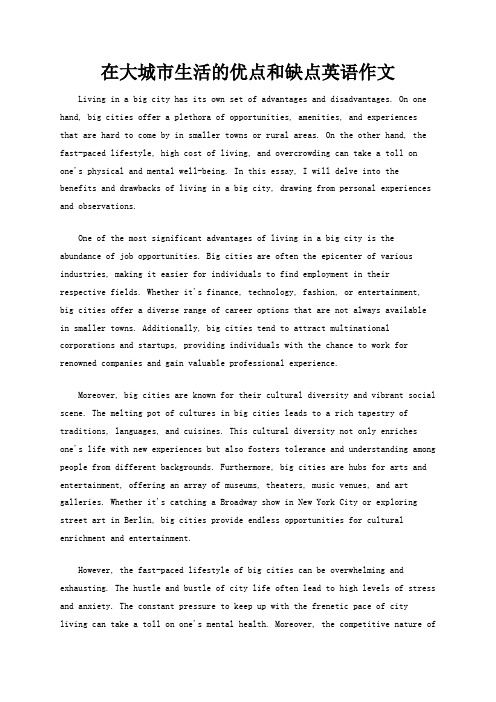
在大城市生活的优点和缺点英语作文Living in a big city has its own set of advantages and disadvantages. On one hand, big cities offer a plethora of opportunities, amenities, and experiencesthat are hard to come by in smaller towns or rural areas. On the other hand, the fast-paced lifestyle, high cost of living, and overcrowding can take a toll onone's physical and mental well-being. In this essay, I will delve into thebenefits and drawbacks of living in a big city, drawing from personal experiences and observations.One of the most significant advantages of living in a big city is the abundance of job opportunities. Big cities are often the epicenter of various industries, making it easier for individuals to find employment in their respective fields. Whether it's finance, technology, fashion, or entertainment, big cities offer a diverse range of career options that are not always available in smaller towns. Additionally, big cities tend to attract multinational corporations and startups, providing individuals with the chance to work for renowned companies and gain valuable professional experience.Moreover, big cities are known for their cultural diversity and vibrant social scene. The melting pot of cultures in big cities leads to a rich tapestry of traditions, languages, and cuisines. This cultural diversity not only enrichesone's life with new experiences but also fosters tolerance and understanding among people from different backgrounds. Furthermore, big cities are hubs for arts and entertainment, offering an array of museums, theaters, music venues, and art galleries. Whether it's catching a Broadway show in New York City or exploring street art in Berlin, big cities provide endless opportunities for cultural enrichment and entertainment.However, the fast-paced lifestyle of big cities can be overwhelming and exhausting. The hustle and bustle of city life often lead to high levels of stress and anxiety. The constant pressure to keep up with the frenetic pace of cityliving can take a toll on one's mental health. Moreover, the competitive nature ofbig cities can breed a sense of isolation and detachment, making it challenging to form genuine connections with others. The anonymity of city life can lead to feelings of loneliness and alienation, especially for those who are new to thecity or have a small social circle.Another downside of living in a big city is the exorbitant cost of living. From steep rents to inflated prices for everyday necessities, big cities can be financially burdensome. Affordable housing is often scarce, forcing many residents to live in cramped quarters or endure long commutes from more affordable areas. The high cost of living also extends to healthcare, transportation, and childcare, making it difficult for individuals and families to make ends meet. As a result, many people in big cities struggle to achieve financial stability and may face hardships in saving for the future.Furthermore, the overcrowding and congestion in big cities can be a major source of frustration. Traffic jams, packed public transportation, and long lines are commonplace in big cities, leading to a significant amount of time wasted on commuting and running errands. The sheer volume of people in big cities can also lead to noise pollution and a lack of personal space. Finding moments of peace and solitude in a city teeming with activity and noise can be a challenge, impacting one's overall quality of life.In conclusion, living in a big city comes with a multitude of advantages and disadvantages. While big cities offer unparalleled opportunities for career advancement, cultural enrichment, and social experiences, they also present challenges such as stress, high living costs, and overcrowding. Ultimately, whether the benefits of big city living outweigh the drawbacks depends on individual preferences and priorities. As someone who has experienced both the allure and the drawbacks of big city living, I can attest to the complex nature of this lifestyle. While big cities have much to offer, they also demand a great deal in return.。
都市生活的利弊英语作文

Urban Life: Its Pros and ConsIn the modern era, urban life has become a norm for millions across the globe. The allure of cities lies in their promise of convenience, entertainment, education, and employment opportunities. However, with these benefits come a set of challenges that need to be addressed. Let's delve into the pros and cons of urban life.**Urban Life: Its Pros**1. **Convenience and Amenities:** Cities are hubs of activity, offering a wide range of amenities and services. From supermarkets and restaurants to hospitals and entertainment centers, everything is easily accessible. This convenience saves time and energy, allowing residents to focus on other important aspects of life.2. **Education and Employment:** Cities are often the centers of education and employment. They provide access to top-tier universities, colleges, and vocational training centers. Additionally, cities offer a wide array of jobopportunities in various industries, including technology, finance, healthcare, and more. 3. **Cultural Diversity:** Urban areas attract people from different parts of thecountry and the world, creating a melting pot of cultures. This cultural diversity enriches the social fabric ofcities, promoting understanding, tolerance, and innovation.4. **Social Activities:** Cities offer a wide range ofsocial activities and events, such as concerts, art exhibitions, sports events, and community gatherings. These activities provide opportunities for residents to socialize, connect, and engage with each other.**Urban Life: Its Cons**1. **High Cost of Living:** Urban areas are often expensive to live in. The cost of housing, transportation, food, and other daily necessities is significantly higher than in rural or suburban areas. This high cost of living can be a burden for many, especially those on fixed incomes or low-income families.2. **Congestion and Pollution:** Cities are densely populated, leading to traffic congestion and air pollution. Long commuting hours and exposure to harmful emissions can have negative impacts on residents' health and well-being.3. **Stress and Anxiety:** The fast-paced lifestyle of cities can be overwhelming for some. The constant hustle and bustle, combined with high expectationsand competition, can lead to stress, anxiety, and even mental health issues. 4. **Isolation and Community Disconnect:** In spite of the cultural diversity and social activities, cities can also breed isolation and a sense of disconnect. The anonymity and density of urban life can make it difficult to form meaningful relationships and connect with the community.**Conclusion**Urban life presents both opportunities and challenges.It offers convenience, education, employment, and cultural diversity, but it also comes with high costs, congestion, stress, and isolation. It is important for residents to strike a balance between these pros and cons, finding waysto enjoy the benefits of city life while mitigating its negative impacts. This may involve seeking out green spaces, engaging in community activities, prioritizing health and well-being, and finding affordable housing options. Bydoing so, urban residents can create a lifestyle that is both fulfilling and sustainable.**都市生活的利弊**在现代社会,都市生活已成为全球数百万人的常态。
城市利弊 英文作文
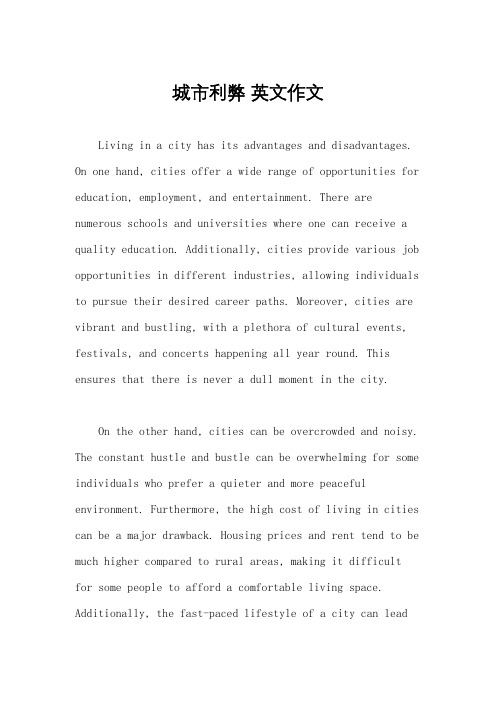
城市利弊英文作文Living in a city has its advantages and disadvantages. On one hand, cities offer a wide range of opportunities for education, employment, and entertainment. There are numerous schools and universities where one can receive a quality education. Additionally, cities provide various job opportunities in different industries, allowing individuals to pursue their desired career paths. Moreover, cities are vibrant and bustling, with a plethora of cultural events, festivals, and concerts happening all year round. This ensures that there is never a dull moment in the city.On the other hand, cities can be overcrowded and noisy. The constant hustle and bustle can be overwhelming for some individuals who prefer a quieter and more peaceful environment. Furthermore, the high cost of living in cities can be a major drawback. Housing prices and rent tend to be much higher compared to rural areas, making it difficultfor some people to afford a comfortable living space. Additionally, the fast-paced lifestyle of a city can leadto increased stress levels and a lack of work-life balance.Another disadvantage of living in a city is the pollution. The air quality in cities is often lower due to the high number of vehicles and industrial activities. This can have detrimental effects on one's health, especiallyfor individuals with respiratory conditions. Noisepollution is also a common issue in cities, with constant traffic, construction, and loud music from bars and clubs. This can affect one's sleep quality and overall well-being.Despite the drawbacks, cities offer a wide range of amenities and conveniences. Public transportation systems are usually well-developed, making it easy to commute around the city. There are also numerous shopping malls, restaurants, and entertainment venues, providing endless options for leisure activities. Moreover, cities are often cultural melting pots, with diverse communities and a variety of cuisines and traditions to explore.In conclusion, living in a city has its pros and cons. While cities offer numerous opportunities for education,employment, and entertainment, they can also be overcrowded, noisy, and polluted. However, the amenities and conveniences of city life, as well as the cultural diversity, make it an attractive option for many individuals. Ultimately, it depends on personal preferences and priorities when deciding whether to embrace the citylife or opt for a quieter and more peaceful environment.。
讨论住在大城市的优点和缺点。 高中英语作文5篇范文 附中文翻译
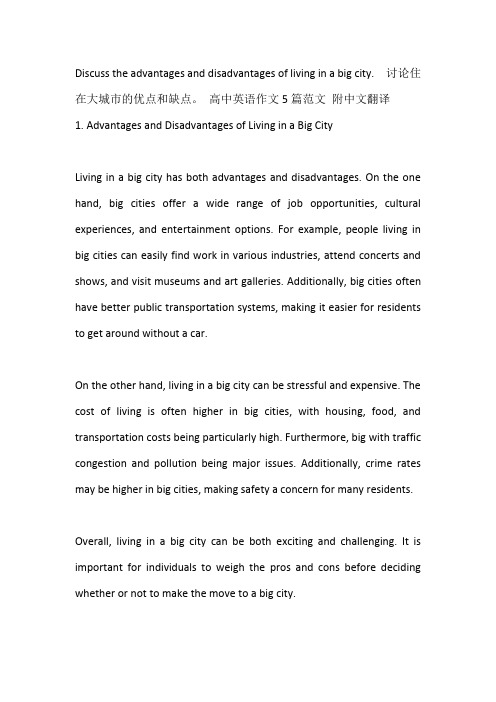
Discuss the advantages and disadvantages of living in a big city. 讨论住在大城市的优点和缺点。
高中英语作文5篇范文附中文翻译1. Advantages and Disadvantages of Living in a Big CityLiving in a big city has both advantages and disadvantages. On the one hand, big cities offer a wide range of job opportunities, cultural experiences, and entertainment options. For example, people living in big cities can easily find work in various industries, attend concerts and shows, and visit museums and art galleries. Additionally, big cities often have better public transportation systems, making it easier for residents to get around without a car.On the other hand, living in a big city can be stressful and expensive. The cost of living is often higher in big cities, with housing, food, and transportation costs being particularly high. Furthermore, big with traffic congestion and pollution being major issues. Additionally, crime rates may be higher in big cities, making safety a concern for many residents.Overall, living in a big city can be both exciting and challenging. It is important for individuals to weigh the pros and cons before deciding whether or not to make the move to a big city.2. The Pros and Cons of Living in a Big CityLiving in a big city has its advantages and disadvantages. One of the main advantages is the abundance of job opportunities. Big cities are often home to major corporations and businesses, providing a wide range of employment options. Additionally, big cities offer a diverse range of cultural experiences, from museums and art galleries to music festivals and theater performances.However, living in a big city can also be expensive and stressful. Housing costs are often higher in big cities, and the cost of living can be steep. Traffic congestion and pollution can also be major issues, making it difficult to get around and enjoy the city. Additionally, crime rates may be higher in big cities, which can be a concern for many residents.Despite these challenges, many people choose to live in big cities because of the opportunities they offer. It is important to weigh the pros and cons before making a decision about where to live.3. Living in a Big City: The Good and the BadLiving in a big city can be both exciting and challenging. On the one hand,big cities offer a wide range of job opportunities, cultural experiences, and entertainment options. For example, people living in big cities can easily find work in various industries, attend concerts and shows, and visit museums and art galleries. Additionally, big cities often have better public transportation systems, making it easier for residents to get around without a car.On the other hand, living in a big city can be stressful and expensive. The cost of living is often higher in big cities, with housing, food, and transportation costs being particularly high. Furthermore, big cities can be crowded and noisy, with traffic congestion and pollution being major issues. Additionally, crime rates may be higher in big cities, making safety a concern for many residents.Overall, living in a big city can be both exciting and challenging. It is important for individuals to weigh the pros and cons before deciding whether or not to make the move to a big city.4. The Advantages and Disadvantages of Living in a Big CityLiving in a big city has its advantages and disadvantages. One of the main advantages is the abundance of job opportunities. Big cities are oftenhome to major corporations and businesses, providing a wide range of employment options. Additionally, big cities offer a diverse range of cultural experiences, from museums and art galleries to music festivals and theater performances.However, living in a big city can also be expensive and stressful. Housing costs are often higher in big cities, and the cost of living can be steep. Traffic congestion and pollution can also be major issues, making it difficult to get around and enjoy the city. Additionally, crime rates may be higher in big cities, which can be a concern for many residents.Despite these challenges, many people choose to live in big cities because of the opportunities they offer. It is important to weigh the pros and cons before making a decision about where to live.5. The Pros and Cons of Living in a Big CityLiving in a big city has its advantages and disadvantages. One of the main advantages is the abundance of job opportunities. Big cities are often home to major corporations and businesses, providing a wide range of employment options. Additionally, big cities offer a diverse range of cultural experiences, from museums and art galleries to music festivalsand theater performances.However, living in a big city can also be expensive and stressful. Housing costs are often higher in big cities, and the cost of living can be steep. Traffic congestion and pollution can also be major issues, making it difficult to get around and enjoy the city. Additionally, crime rates may be higher in big cities, which can be a concern for many residents.Despite these challenges, many people choose to live in big cities because of the opportunities they offer. It is important to weigh the pros and cons before making a decision about where to live.。
在大城市生活的好处与坏处英语作文
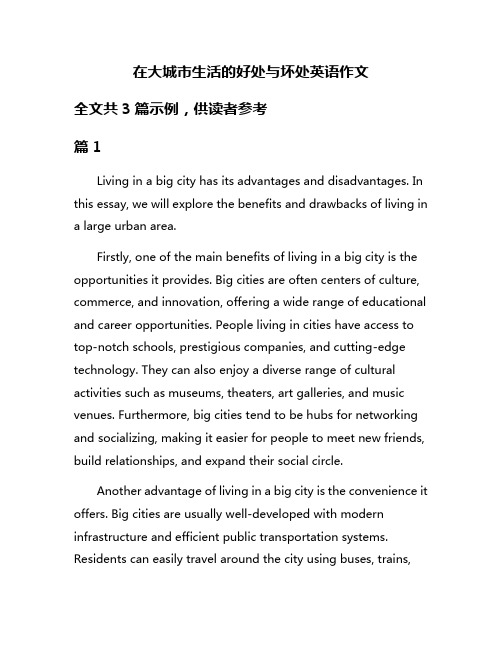
在大城市生活的好处与坏处英语作文全文共3篇示例,供读者参考篇1Living in a big city has its advantages and disadvantages. In this essay, we will explore the benefits and drawbacks of living in a large urban area.Firstly, one of the main benefits of living in a big city is the opportunities it provides. Big cities are often centers of culture, commerce, and innovation, offering a wide range of educational and career opportunities. People living in cities have access to top-notch schools, prestigious companies, and cutting-edge technology. They can also enjoy a diverse range of cultural activities such as museums, theaters, art galleries, and music venues. Furthermore, big cities tend to be hubs for networking and socializing, making it easier for people to meet new friends, build relationships, and expand their social circle.Another advantage of living in a big city is the convenience it offers. Big cities are usually well-developed with modern infrastructure and efficient public transportation systems. Residents can easily travel around the city using buses, trains,subways, or taxis. In addition, cities are home to a wide variety of amenities such as shopping malls, restaurants, gyms, parks, and healthcare facilities, making it easy for people to find everything they need within close proximity.Moreover, big cities tend to be melting pots of different cultures and ethnicities, creating a diverse and vibrant community. People living in cities have the opportunity to interact with individuals from different backgrounds, learn about different customs and traditions, and broaden their perspectives. This cultural diversity can enrich people's lives and enhance their understanding of the world.However, living in a big city also has its downsides. One of the main drawbacks is the high cost of living. Cities are often more expensive than rural areas in terms of housing, utilities, groceries, transportation, and entertainment. Rent prices can be sky-high, making it difficult for people to afford a decent living space. In addition, congestion and traffic jams are common issues in big cities, leading to long commutes, pollution, and stress.Furthermore, big cities can be overwhelming and impersonal. The fast-paced lifestyle, the hustle and bustle of the city, and the constant noise and pollution can take a toll on people's mentaland physical health. Residents may feel isolated, disconnected, and anxious in such a hectic environment. The high population density in cities can also lead to overcrowding, competition, and crime rates.In conclusion, living in a big city has both advantages and disadvantages. While big cities offer plenty of opportunities, conveniences, and cultural experiences, they also come with high costs, congestion, and stress. Ultimately, the decision to live in a big city depends on individual preferences and priorities. Some people may thrive in the dynamic and diverse urban environment, while others may prefer the tranquility and simplicity of rural life.篇2Living in a big city has its own advantages and disadvantages. In this essay, we will explore the benefits and drawbacks of living in a large metropolitan area.Firstly, one of the major benefits of living in a big city is the plethora of job opportunities available. Big cities are home to numerous companies, organizations, and industries, providing a wide range of job options for residents. This can lead to better career prospects, higher salaries, and more chances for careeradvancement. Additionally, big cities often attract top talent from around the world, creating a diverse and competitive job market.Secondly, big cities offer a wide range of entertainment options. From theaters and museums to restaurants and shopping centers, there is always something to do and see in a big city. Residents can enjoy a vibrant cultural scene, attend concerts and events, and explore different cuisines from around the world. Big cities also tend to have better public transportation systems, making it easier for residents to get around and access these entertainment possibilities.Furthermore, living in a big city can provide a higher quality of education and healthcare. Big cities are typically home to top universities, research institutions, and medical facilities, offering residents access to world-class education and healthcare services. This can lead to better educational opportunities for children and better healthcare outcomes for residents.However, living in a big city also has its drawbacks. One of the main disadvantages is the high cost of living. Big cities tend to have higher housing prices, higher taxes, and higher overall expenses compared to smaller towns and rural areas. This canmake it challenging for some residents to afford basic necessities and maintain a high standard of living.Another downside of living in a big city is the overcrowding and congestion. Big cities are often densely populated, leading to traffic jams, long commutes, and crowded public spaces. This can result in increased stress, pollution, and noise levels, impacting residents' quality of life and overall well-being.In conclusion, living in a big city has its pros and cons. While big cities offer numerous job opportunities, entertainment options, and access to quality education and healthcare, they also come with a high cost of living and challenges related to overcrowding and congestion. Ultimately, whether living in a big city is beneficial or not depends on individual preferences and circumstances.篇3Living in a big city has its benefits and drawbacks. In this essay, we will explore the advantages and disadvantages of living in a large urban area.One of the main advantages of living in a big city is the abundance of opportunities. Cities are often hubs of commerce, culture, and innovation, providing residents with a wide range ofcareer options and cultural experiences. In addition, cities tend to attract a diverse population, allowing individuals to interact with people from different backgrounds and learn about new perspectives.Another advantage of city living is the convenience. Cities typically have a well-developed infrastructure, including public transportation systems, hospitals, schools, and recreational facilities. This makes it easy for residents to access essential services and amenities without having to travel far. In addition, cities are often home to a variety of dining, entertainment, and shopping options, providing residents with a wealth of choices for leisure activities.On the other hand, living in a big city also comes with its challenges. One of the main drawbacks is the high cost of living. Rent, food, transportation, and other expenses are typically higher in cities compared to rural areas, making it more difficult for some people to afford a comfortable standard of living. In addition, the fast pace of city life can be stressful and overwhelming, leading to feelings of burnout and anxiety.Another downside of city living is the lack of space. In crowded urban areas, housing tends to be more compact and expensive, with limited green spaces and outdoor areas. This canmake it challenging for residents to find a peaceful retreat from the hustle and bustle of city life. In addition, traffic congestion and pollution are common problems in big cities, impacting residents' quality of life and overall health.In conclusion, living in a big city has both advantages and disadvantages. While cities offer a wealth of opportunities and conveniences, they can also be expensive, stressful, and crowded. Ultimately, the decision to live in a city or not depends on individual preferences and priorities. It is important for residents to weigh the pros and cons carefully before choosing where to live.。
生活在大城市的好处和坏处英语作文
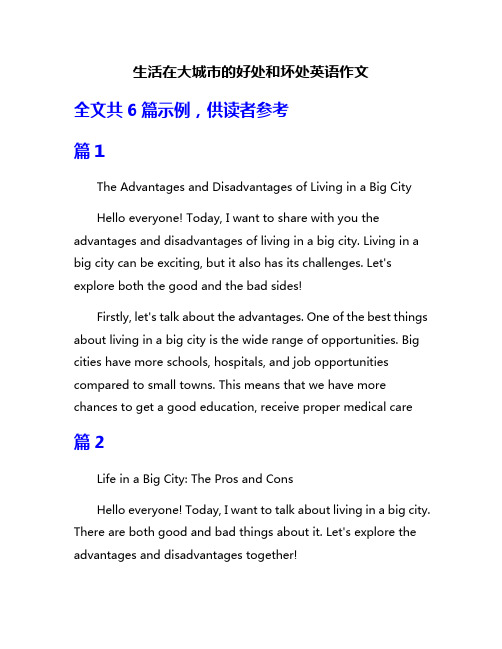
生活在大城市的好处和坏处英语作文全文共6篇示例,供读者参考篇1The Advantages and Disadvantages of Living in a Big CityHello everyone! Today, I want to share with you the advantages and disadvantages of living in a big city. Living in a big city can be exciting, but it also has its challenges. Let's explore both the good and the bad sides!Firstly, let's talk about the advantages. One of the best things about living in a big city is the wide range of opportunities. Big cities have more schools, hospitals, and job opportunities compared to small towns. This means that we have more chances to get a good education, receive proper medical care篇2Life in a Big City: The Pros and ConsHello everyone! Today, I want to talk about living in a big city. There are both good and bad things about it. Let's explore the advantages and disadvantages together!Living in a big city has many advantages. First of all, there are so many exciting things to do and see! You can visit famous landmarks, like tall buildings and historical places. The city is always alive with events, such as concerts and festivals. It's like a big playground for us to explore and have fun.Secondly, big cities offer a lot of educational opportunities. There are many good schools with excellent teachers. We can learn new things and develop our skills. Libraries and museums are also easily accessible, where we can discover interesting facts and learn about different cultures.Moreover, big cities have a wide range of job opportunities. When we grow up, we can find jobs that match our interests and talents. There are many industries and businesses that provide various career paths. This means we can pursue our dreams and achieve success.However, living in a big city also has its drawbacks. One major disadvantage is the high cost of living. Everything, from housing to groceries, can be more expensive compared to smaller towns. This means our parents need to work harder to support our family. We may have to make some sacrifices to afford the things we want.Another problem is the traffic. Big cities are often crowded, and there are many cars on the roads. This can lead to long commutes and traffic jams. Sometimes, it feels like we spend more time in transportation than enjoying our free time. It's important to plan our schedules wisely and use public transportation whenever possible.Lastly, big cities can be noisy and polluted. With so many people and vehicles, there is often noise pollution from honking horns and construction work. Air pollution can also be a concern, as there are more factories and vehicles emitting harmful substances. We need to take care of our health and find ways to relax amidst the chaos.In conclusion, living in a big city has its pros and cons. It offers exciting opportunities, education, and career prospects. However, it can also be expensive, crowded, and polluted. As young students, we should appreciate the benefits of city life while being aware of its challenges. By making smart choices, we can make the most out of our lives in the big city!Remember, no matter where we live, it's important to be grateful and make the best of our circumstances. So, let's embrace the advantages and find solutions to overcome thedisadvantages. Life in a big city can be an amazing adventure if we approach it with a positive attitude!篇3Living in a Big CityI live in a big city, and I want to tell you about the advantages and disadvantages of living here.Living in a big city has many advantages. One of the good things is that there are a lot of opportunities for education. There are many good schools and libraries where we can learn and explore new things. We can meet people from different cultures and make friends with them. It helps us to learn about different traditions and customs.Big cities also have many entertainment options. There are parks, museums, theaters, and shopping malls. We can visit these places and have a lot of fun with our families and friends. In addition, big cities often have better medical facilities. If we get sick, we can go to hospitals where there are good doctors who can take care of us.However, living in a big city also has some disadvantages. One of the problems is the high cost of living. Everything, likefood and housing, is more expensive here. People need to work hard and earn more money to afford their daily expenses. Another issue is the traffic. Big cities have a lot of cars, buses, and motorcycles, which can cause traffic jams. It takes a long time to get from one place to another.Moreover, big cities can be crowded and noisy. There are many people everywhere, and it can sometimes be overwhelming. The air pollution is also a concern in big cities. The tall buildings and the large number of vehicles can make the air dirty and unhealthy.In conclusion, living in a big city has its advantages and disadvantages. There are many opportunities for education and entertainment, but the cost of living is high, and there can be problems like traffic and pollution. It's important to weigh the pros and cons before deciding where to live.以上就是关于生活在大城市的好处和坏处的英语作文。
城市生活的好处和坏处的英语作文
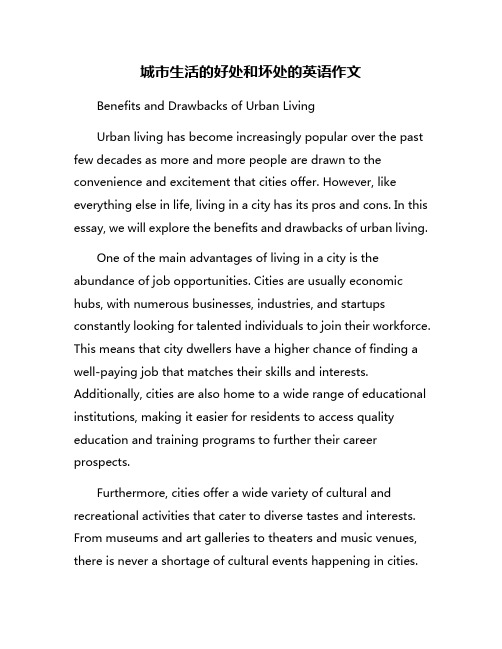
城市生活的好处和坏处的英语作文Benefits and Drawbacks of Urban LivingUrban living has become increasingly popular over the past few decades as more and more people are drawn to the convenience and excitement that cities offer. However, like everything else in life, living in a city has its pros and cons. In this essay, we will explore the benefits and drawbacks of urban living.One of the main advantages of living in a city is the abundance of job opportunities. Cities are usually economic hubs, with numerous businesses, industries, and startups constantly looking for talented individuals to join their workforce. This means that city dwellers have a higher chance of finding a well-paying job that matches their skills and interests. Additionally, cities are also home to a wide range of educational institutions, making it easier for residents to access quality education and training programs to further their career prospects.Furthermore, cities offer a wide variety of cultural and recreational activities that cater to diverse tastes and interests. From museums and art galleries to theaters and music venues, there is never a shortage of cultural events happening in cities.Additionally, cities are also known for their vibrant nightlife, with clubs, bars, and restaurants open late into the night, providing entertainment options for night owls and partygoers.Another advantage of urban living is the accessibility of essential services and amenities. Cities are usually well-equipped with healthcare facilities, supermarkets, shopping malls, banks, and other essential services, making it convenient for residents to access everything they need within a short distance. Public transportation in cities is also more developed, with options such as buses, subways, and trains making it easier for residents to get around without needing a car.On the flip side, urban living also has its drawbacks. One of the main disadvantages of living in a city is the high cost of living. Rent, food, transportation, and other expenses in cities are usually higher compared to rural areas, making it difficult for lower-income individuals to afford a comfortable lifestyle. As a result, many city dwellers struggle to make ends meet and are forced to live in cramped living spaces or share accommodation with roommates to save money.Furthermore, cities are often overcrowded, leading to traffic congestion, pollution, and noise levels that can negatively impact residents' quality of life. The hustle and bustle of city lifecan also be stressful and overwhelming for some people, especially those who prefer a quieter and more peaceful environment. Additionally, the fast-paced nature of cities can make it challenging for residents to strike a healthy work-life balance, leading to burnout and mental health issues.In conclusion, urban living offers a host of benefits such as job opportunities, cultural activities, and convenient access to services and amenities. However, it also comes with drawbacks such as high living costs, overcrowding, and stress. Ultimately, whether city living is right for an individual depends on their personal preferences, lifestyle, and priorities.城市生活的好处和坏处城市生活在过去几十年变得越来越受欢迎,越来越多的人被城市所提供的便利和刺激所吸引。
关于城市生活优劣势的英语作文
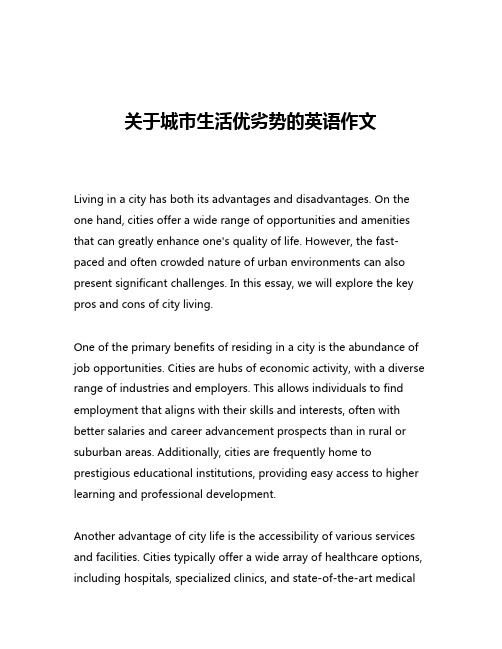
关于城市生活优劣势的英语作文Living in a city has both its advantages and disadvantages. On the one hand, cities offer a wide range of opportunities and amenities that can greatly enhance one's quality of life. However, the fast-paced and often crowded nature of urban environments can also present significant challenges. In this essay, we will explore the key pros and cons of city living.One of the primary benefits of residing in a city is the abundance of job opportunities. Cities are hubs of economic activity, with a diverse range of industries and employers. This allows individuals to find employment that aligns with their skills and interests, often with better salaries and career advancement prospects than in rural or suburban areas. Additionally, cities are frequently home to prestigious educational institutions, providing easy access to higher learning and professional development.Another advantage of city life is the accessibility of various services and facilities. Cities typically offer a wide array of healthcare options, including hospitals, specialized clinics, and state-of-the-art medicaltechnology. This ensures that residents have access to quality healthcare when needed. Furthermore, cities often boast an extensive public transportation network, allowing individuals to navigate the urban landscape with ease and reducing the need for personal vehicle ownership.The cultural richness of cities is another significant draw. Urban areas are renowned for their vibrant arts and entertainment scenes, with a plethora of museums, theaters, concert halls, and art galleries. This exposure to diverse cultural experiences can broaden one's horizons and foster a greater appreciation for the arts. Additionally, cities are often home to a wide range of restaurants, cafes, and specialty shops, catering to diverse culinary preferences and offering opportunities for social interaction and exploration.However, the advantages of city living are not without their drawbacks. One of the primary challenges is the high cost of living. Housing prices, rent, and the overall cost of goods and services tend to be significantly higher in cities compared to suburban or rural areas. This can place a significant financial burden on individuals, particularly those with lower incomes, and may limit their ability to save or invest.Another downside of city life is the issue of overcrowding and traffic congestion. With a high population density, cities can often feelcrowded and overwhelming, with limited personal space and increased competition for resources. This can lead to stress, anxiety, and a sense of isolation, as individuals may struggle to find a sense of community or personal connection. Additionally, the heavy traffic and congestion in cities can result in longer commute times, increased air pollution, and a higher risk of accidents, all of which can negatively impact the quality of life.Furthermore, the fast-paced nature of city life can be mentally and physically taxing. The constant noise, stimulation, and demands of urban living can contribute to higher levels of stress and burnout, as individuals struggle to maintain a work-life balance. This can have detrimental effects on mental health and overall well-being, leading to issues such as depression, anxiety, and chronic fatigue.Another drawback of city life is the potential for increased crime and safety concerns. While not all cities are plagued by high crime rates, the concentration of people and resources can attract criminal activity, which can make residents feel less secure and limit their freedom to explore their surroundings. This can lead to a heightened sense of fear and a reduced quality of life.Finally, the environmental impact of cities is a significant concern. The high density of population, the reliance on fossil fuels for transportation and energy, and the generation of waste cancontribute to air and water pollution, as well as the depletion of natural resources. This can have far-reaching consequences for the local and global environment, and may require concerted efforts to address sustainability and eco-friendly initiatives.In conclusion, the decision to live in a city involves weighing the pros and cons. While cities offer a wealth of opportunities, amenities, and cultural experiences, they also present significant challenges in terms of cost of living, overcrowding, stress, and environmental concerns. Ultimately, the decision to reside in a city will depend on an individual's priorities, lifestyle preferences, and ability to navigate the unique demands of urban living. By understanding the advantages and disadvantages of city life, individuals can make an informed decision that aligns with their personal and professional goals.。
大城市的优缺点英语作文
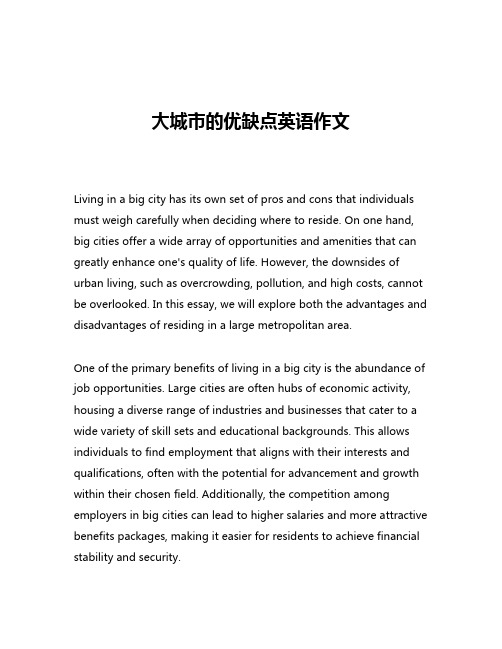
大城市的优缺点英语作文Living in a big city has its own set of pros and cons that individuals must weigh carefully when deciding where to reside. On one hand, big cities offer a wide array of opportunities and amenities that can greatly enhance one's quality of life. However, the downsides of urban living, such as overcrowding, pollution, and high costs, cannot be overlooked. In this essay, we will explore both the advantages and disadvantages of residing in a large metropolitan area.One of the primary benefits of living in a big city is the abundance of job opportunities. Large cities are often hubs of economic activity, housing a diverse range of industries and businesses that cater to a wide variety of skill sets and educational backgrounds. This allows individuals to find employment that aligns with their interests and qualifications, often with the potential for advancement and growth within their chosen field. Additionally, the competition among employers in big cities can lead to higher salaries and more attractive benefits packages, making it easier for residents to achieve financial stability and security.Another advantage of urban living is the access to a wide range of amenities and services. Big cities typically offer a vast array of entertainment options, from theaters and concert halls to museums and art galleries. Residents can enjoy a vibrant cultural scene, with a diverse selection of restaurants, bars, and nightlife to choose from. Furthermore, big cities often have well-developed transportation systems, including public transit, bike-sharing programs, and efficient road networks, making it easier for residents to navigate the city and access the resources they need.Moreover, living in a big city can provide individuals with a sense of anonymity and freedom. In a large metropolitan area, people can often blend into the crowd and enjoy a level of privacy that may be more difficult to achieve in smaller communities. This can be particularly appealing for those seeking to explore new experiences and express their individuality without the same level of social scrutiny.However, the advantages of big city living are not without their drawbacks. One of the most significant challenges is the issue of overcrowding. With a large population concentrated in a relatively small geographic area, big cities can become congested and overcrowded, leading to long commute times, limited living space, and a general sense of being overwhelmed by the sheer number of people. This can contribute to feelings of stress and anxiety, as wellas a decreased sense of community and connection among residents.Another major downside of living in a big city is the problem of pollution. The high levels of traffic, industrial activity, and energy consumption in large metropolitan areas can result in poor air quality, water contamination, and excessive noise pollution. These environmental issues can have detrimental effects on the health and well-being of residents, leading to respiratory problems, increased risk of certain illnesses, and a general reduction in quality of life.Furthermore, the cost of living in a big city can be significantly higher than in smaller towns or rural areas. Housing prices, utility costs, and the price of goods and services tend to be more expensive in urban centers, making it challenging for individuals, especially those with lower incomes, to afford a comfortable standard of living. This can lead to financial strain and the need to make difficult trade-offs in terms of housing, transportation, and other essential expenses.Additionally, the fast-paced and highly competitive nature of big city life can be emotionally and mentally taxing for some individuals. The constant pressure to keep up with the demands of work, social obligations, and the perceived need to maintain a certain lifestyle can contribute to feelings of stress, burnout, and a lack of work-life balance. This can have a detrimental impact on an individual's overall well-being and quality of life.In conclusion, the decision to live in a big city is a complex one that requires careful consideration of both the advantages and disadvantages. While big cities offer a wealth of opportunities, amenities, and a sense of anonymity, they also come with the challenges of overcrowding, pollution, high costs, and the potential for emotional and mental strain. Ultimately, the choice to reside in a large metropolitan area will depend on an individual's personal preferences, priorities, and ability to navigate the unique challenges and benefits of urban living.。
城市生活英语作文(精彩7篇)

城市生活英语作文(精彩7篇)(经典版)编制人:__________________审核人:__________________审批人:__________________编制单位:__________________编制时间:____年____月____日序言下载提示:该文档是本店铺精心编制而成的,希望大家下载后,能够帮助大家解决实际问题。
文档下载后可定制修改,请根据实际需要进行调整和使用,谢谢!并且,本店铺为大家提供各种类型的经典范文,如计划报告、合同协议、心得体会、演讲致辞、条据文书、策划方案、规章制度、教学资料、作文大全、其他范文等等,想了解不同范文格式和写法,敬请关注!Download tips: This document is carefully compiled by this editor. I hope that after you download it, it can help you solve practical problems. The document can be customized and modified after downloading, please adjust and use it according to actual needs, thank you!Moreover, our store provides various types of classic sample essays, such as plan reports, contract agreements, insights, speeches, policy documents, planning plans, rules and regulations, teaching materials, complete essays, and other sample essays. If you would like to learn about different sample formats and writing methods, please stay tuned!城市生活英语作文(精彩7篇)城市生活的利与弊高考英语的满分作文篇一城市生活的利与弊高考英语的满分作文Living in a city has both advantages and disadvantages.It is often easier to find work.There are always many choices of public transport.Besides,there are a lot of interesting things to do and places to see.You can eat in good restaurants,visit museums, go to cinemas and go to parks whenever you want to relaX.However, living in a city is often very eXpensive.You must find a well-paid job, otherwise, you will not be able to afford the things you will do.Whats more, the city is always crowded, noisy and dirty.It is very difficult to find a good place where people can enjoy peace and fresh air as in the countryside.城市生活作文篇二城市生活当城里人刚刚起床时,听到的不是清脆悦耳的鸡鸣声,而是汽车飞驰过地面的“嚓嚓”声和清洁工人的脚步声,往窗口望去,高高低低的楼房仿佛一块块五彩斑斓的宝石镶嵌在一条条长而宽的马路之间,汽车的汽笛声,汽车排出尾气时的噪音和公交车到站的预告形成了一个嘈杂的环境。
城市生活利弊英语作文怎么写
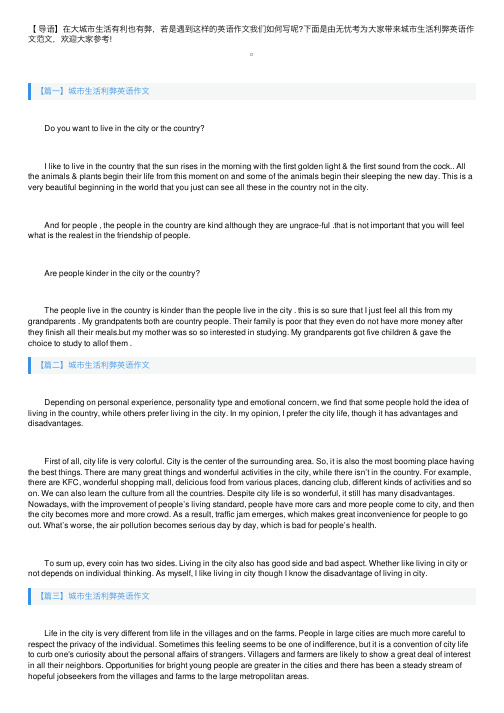
The people live in the country is kinder than the people live in the city . this is so sure that I just feel all this from my grandparents . My grandpatents both are country people. Their family is poor that they even do not have more money after they finish all their meals.but my mother was so so interested in studying. My grandparents got five children & gave the choice to study to allof them .
【篇二】城市生活利弊英语作文
Depending on personal experience, personality type and emotional concern, we find that some people hold the idea of living in the country, while others prefer living in the city. In my opinion, I prefer the city life, though it has advantages and disadvantages.
To sum up, every coin has two sides. Living in the city also has good side and bad aspect. Whether like living in city or not depends on individual thinking. As myself, I like living in city though I know the disadvantage of living in city.
城市生活英文作文
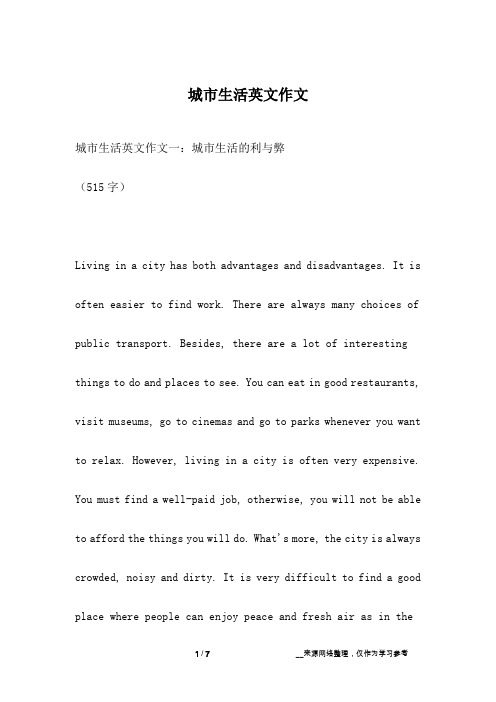
城市生活英文作文城市生活英文作文一:城市生活的利与弊(515字)Living in a city has both advantages and disadvantages. It is often easier to find work. There are always many choices of public transport. Besides, there are a lot of interesting things to do and places to see. You can eat in good restaurants, visit museums, go to cinemas and go to parks whenever you want to relax. However, living in a city is often very expensive. You must find a well-paid job, otherwise, you will not be able to afford the things you will do. What's more, the city is always crowded, noisy and dirty. It is very difficult to find a good place where people can enjoy peace and fresh air as in thecountryside.城市生活英文作文二:City and Country Life(491字)Life in the city is very different from life in the villages and on the farms. People in large cities are much more careful to respect the privacy of the individual. Sometimes this feeling seems to be one of indifference, but it is a convention of city life to curb one's curiosity about the personal affairs of strangers. Villagers and farmers are likely to show a great deal of interest in all their neighbors. Opportunities for bright young people are greater in the cities and there has been a steady stream of hopeful jobseekers from the villages and farms to the large metropolitan areas.城市生活英文作文三:城市生活 City Life(1123字)Depending on personal experience, personality type and emotional concern, we find that some people hold the idea of living in the country, while others prefer living in the city. In my opinion, I prefer the city life, though it has advantages and disadvantages.First of all, city life is very colorful. City is the center of the surrounding area. So, it is also the most booming place having the best things. There are many great things and wonderful activities in the city, while there isn’t in the country. For example, there are KFC, wonderful shopping mall, delicious food from various places, dancing club, differentkinds of activities and so on. We can also learn the culture from all the countries. Despite city life is so wonderful, it still has many disadvantages. Nowadays, with the improvement of people’s living standard, people have more cars and more people come to city, and then the city becomes more and more crowd. As a result, traffic jam emerges, which makes great inconvenience for people to go out. What’s worse, the air pollution becomes serious day by day, which is bad for people’s health.To sum up, every coin has two sides. Living in the city also has good side and bad aspect. Whether like living in city or not depends on individual thinking. As myself, I like living in city though I know the disadvantage of living in city.城市生活英文作文四:The city life I expec(500字)What I expect for city life is not just about drink bars, shopping mall, entertainment center etc, although they are indeed better than the facility in the rural areas. What I expect for city life is a clearer environment, not only in the surroundings but also in people's spirit. I hope the people around me are all good mannered with politeness and courtesy, there is no quarrel, no battle, people treat each other with respect. I hope there would be no traffic jam as in Beijing our country capital today where traffic jam happened everyday, which make the citizens feel depressed and great pressure.城市生活英文作文五:city life(836字)Do you want to live in the city or the country?I like to live in the country that the sun rises in the morning with the first golden light & the first sound from the cock.. All the animals & plants begin their life from this moment on and some of the animals begin their sleeping the new day. This is a very beautiful beginning in the world that you just can see all these in the country not in the city.And for people , the people in the country are kind although they are ungrace-ful .that is not important that you will feel what is the realest in the friendship of people.Are people kinder in the city or the country?The people live in the country is kinder than the people live in the city . this is so sure that I just feel all this from my grandparents . My grandpatents both are country people.Their family is poor that they even do not have more money after they finish all their meals.but my mother was so so interested in studying. My grandparents got five children & gave the choice to study to allof them .。
都市生活的利弊英语作文
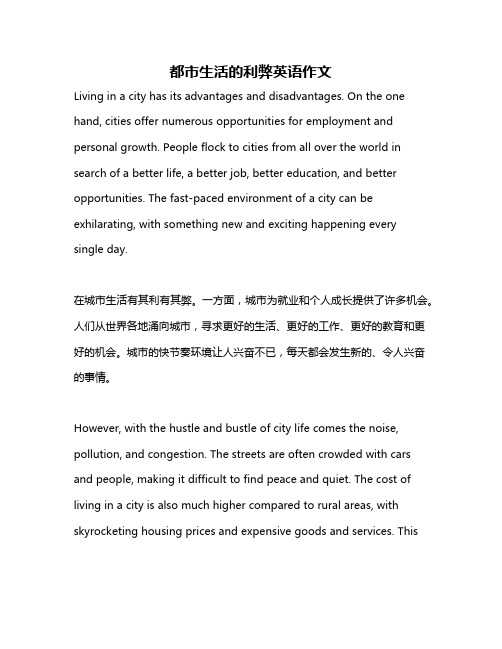
都市生活的利弊英语作文Living in a city has its advantages and disadvantages. On the one hand, cities offer numerous opportunities for employment and personal growth. People flock to cities from all over the world in search of a better life, a better job, better education, and better opportunities. The fast-paced environment of a city can be exhilarating, with something new and exciting happening every single day.在城市生活有其利有其弊。
一方面,城市为就业和个人成长提供了许多机会。
人们从世界各地涌向城市,寻求更好的生活、更好的工作、更好的教育和更好的机会。
城市的快节奏环境让人兴奋不已,每天都会发生新的、令人兴奋的事情。
However, with the hustle and bustle of city life comes the noise, pollution, and congestion. The streets are often crowded with cars and people, making it difficult to find peace and quiet. The cost of living in a city is also much higher compared to rural areas, with skyrocketing housing prices and expensive goods and services. Thiscan put a strain on individuals and families, leading to financial stress and worries about the future.然而,随着城市生活的喧嚣来了噪音、污染和拥挤。
关于城市生活优劣势的英语作文

关于城市生活优劣势的英语作文Advantages and Disadvantages of City LifeCity life has both its pros and cons.One of the major advantages of living in a city is the convenience. There are various public transportation options such as buses, subways, and taxis, making it easy to get around. Cities also offer a wide range of services like healthcare, education, and entertainment. You can find good schools,top-notch hospitals, and countless shopping malls, cinemas, and restaurants.Moreover, cities provide more job opportunities. Different industries and businesses thrive in urban areas, allowing people to pursue diverse careers and have better chances of professional growth.However, city life also has its drawbacks. The cost of living in cities is often high. Housing prices, food, and other essentials can be expensive. Traffic congestion is a common problem, causing long commutes and wasted time. Noise pollution and air pollution are also serious issues that can affect people's health and quality of life.In conclusion, while city life offers numerous benefits in terms of convenience and opportunities, it also comes withchallenges such as high costs and environmental problems.翻译:《城市生活的优劣势》城市生活既有优点也有缺点。
有关城市生活优缺点的英语作文
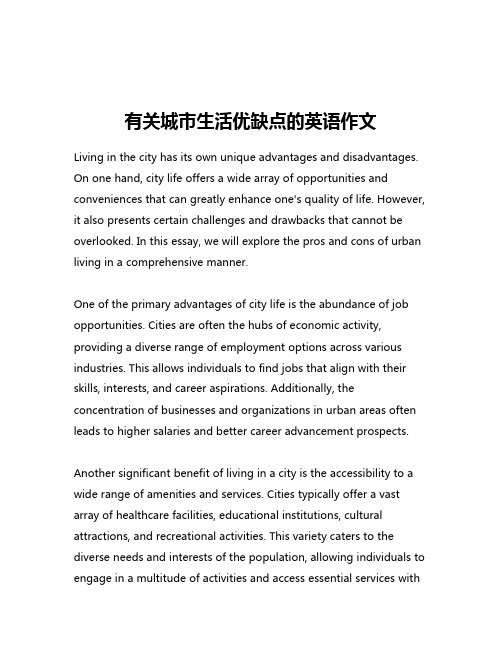
有关城市生活优缺点的英语作文Living in the city has its own unique advantages and disadvantages. On one hand, city life offers a wide array of opportunities and conveniences that can greatly enhance one's quality of life. However, it also presents certain challenges and drawbacks that cannot be overlooked. In this essay, we will explore the pros and cons of urban living in a comprehensive manner.One of the primary advantages of city life is the abundance of job opportunities. Cities are often the hubs of economic activity, providing a diverse range of employment options across various industries. This allows individuals to find jobs that align with their skills, interests, and career aspirations. Additionally, the concentration of businesses and organizations in urban areas often leads to higher salaries and better career advancement prospects.Another significant benefit of living in a city is the accessibility to a wide range of amenities and services. Cities typically offer a vast array of healthcare facilities, educational institutions, cultural attractions, and recreational activities. This variety caters to the diverse needs and interests of the population, allowing individuals to engage in a multitude of activities and access essential services withrelative ease. The availability of public transportation systems, such as buses, trains, and subways, further enhances the convenience of city living by providing efficient means of commuting and exploring the urban landscape.Furthermore, city life often fosters a sense of community and cultural diversity. Urban areas are home to people from various backgrounds, ethnicities, and socioeconomic statuses, which can lead to a rich exchange of ideas, traditions, and perspectives. This diversity can expose individuals to new experiences, broaden their horizons, and foster a greater understanding and appreciation of different cultures. Additionally, cities often host a vibrant arts and entertainment scene, offering opportunities to attend concerts, theater performances, art exhibitions, and other cultural events.However, the advantages of city life are not without their drawbacks. One of the most significant challenges is the high cost of living. Housing prices, rent, and the overall cost of goods and services are typically much higher in urban areas compared to suburban or rural regions. This can create financial strain for individuals and families, particularly those with limited incomes, and may limit their ability to afford a comfortable standard of living.Another significant downside of city life is the issue of overcrowding and congestion. The high population density in cities can lead totraffic jams, overcrowded public transportation, and a general sense of crowdedness and lack of personal space. This can result in increased stress levels, longer commute times, and a diminished sense of privacy and personal freedom.Moreover, the fast-paced and often hectic nature of city life can take a toll on one's mental and physical well-being. The constant noise, pollution, and hustle and bustle can contribute to feelings of anxiety, depression, and burnout. Additionally, the lack of access to green spaces and natural environments in urban areas can negatively impact an individual's overall well-being and connection with nature.Furthermore, the high population density in cities can also lead to challenges in terms of resource allocation and environmental sustainability. The demand for housing, transportation, and other infrastructure can put a strain on the city's resources and contribute to environmental degradation, such as air and water pollution, waste management issues, and the depletion of natural resources.In conclusion, the decision to live in a city involves carefully weighing the advantages and disadvantages. While city life offers a wealth of opportunities, conveniences, and cultural experiences, it also presents significant challenges in terms of cost of living, overcrowding, and the potential impact on mental and physical well-being. Ultimately, the choice to reside in an urban area will dependon an individual's personal preferences, priorities, and the ability to navigate the complexities of city living. Regardless of the decision, it is crucial to be aware of the trade-offs and take proactive steps to address the potential drawbacks of urban living.。
生活在大城市的好处和坏处英语作文
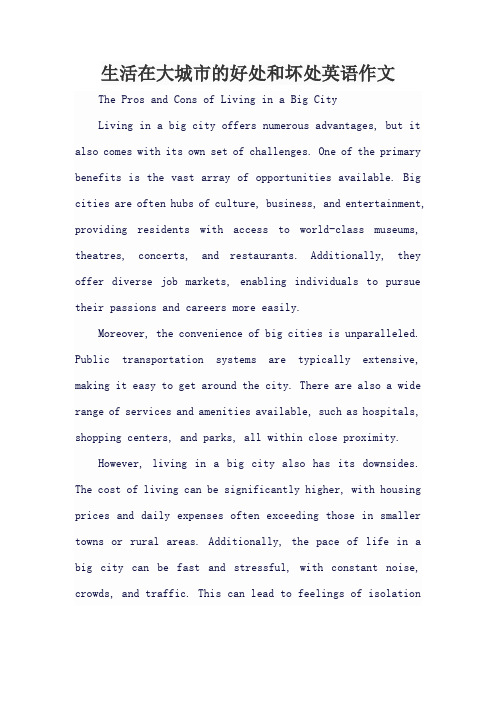
生活在大城市的好处和坏处英语作文The Pros and Cons of Living in a Big CityLiving in a big city offers numerous advantages, but it also comes with its own set of challenges. One of the primary benefits is the vast array of opportunities available. Big cities are often hubs of culture, business, and entertainment, providing residents with access to world-class museums, theatres, concerts, and restaurants. Additionally, they offer diverse job markets, enabling individuals to pursue their passions and careers more easily.Moreover, the convenience of big cities is unparalleled. Public transportation systems are typically extensive, making it easy to get around the city. There are also a wide range of services and amenities available, such as hospitals, shopping centers, and parks, all within close proximity.However, living in a big city also has its downsides. The cost of living can be significantly higher, with housing prices and daily expenses often exceeding those in smaller towns or rural areas. Additionally, the pace of life in a big city can be fast and stressful, with constant noise, crowds, and traffic. This can lead to feelings of isolationor loneliness, especially for those who struggle to make friends or maintain social connections.Furthermore, big cities often face environmental challenges such as air pollution and traffic congestion. The dense population and high concentration of industries can contribute to these issues, affecting the quality of life for residents.In conclusion, while living in a big city offers numerous benefits, it also has its own set of challenges. It is important to carefully consider these pros and cons when deciding whether to relocate to a big city or stay in a smaller community.。
